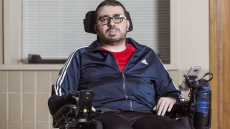TORONTO — A campaign to ban circumcision for infants and children has taken hold in Iceland and Denmark but is far too radical a notion for Canada to consider, say observers here.
Despite declining rates of circumcision, many Canadians remain ardent advocates of the right to snip — and not just for religious reasons, notes York University human rights Prof. Minoo Derayeh.
The academic, a specialist on world religions, notes that Canada's significantly more racially diverse population makes the politicized issue tougher to reconcile with a national identity rooted in tolerance and liberalism.
"Our immigration law is more towards multiculturalism so we are all a part of the mosaic and it's a part of the identity of people," says Derayeh, noting it would be hard for a Jewish or Muslim person to not see this as an affront to tenets of their faith.
A Canadian Jewish human rights group condemned the Nordic movement this week, insisting "there can be no Jewish community without circumcision."
"Although it's proposed using human rights language, this is rather the denial of rights — it's the denial of religious rights," Michael Mostyn, chief executive officer of B'nai Brith Canada, adds in an interview.
"Should this proposal pass, these communities will no longer be able to exist as viable communities in Iceland. Circumcision is not discretionary but it is rather central in Jewish life and practice throughout history."
Iceland's parliament proposed a controversial age-restricted bill last month that would make it a crime to circumcise a baby for non-medical reasons, arguing that boys are unable to "give informed consent to an irreversible physical intervention."
At least 400 doctors have backed the bill, but religious groups around the world are pushing back, fearing its success could empower politicians elsewhere to bring in their own restrictions.
And a broader movement to ban circumcision — the act of removing the foreskin of the penis, usually when the child is a newborn — does appear to be gaining steam.
Anti-circumcision activists in Denmark are circulating a petition to force their government to consider a similar law. They've reportedly collected nearly half of the 50,000 signatures they need to create a bill that would set 18 years as the minimum age for the procedure.
The founder of the Canadian Foreskin Awareness Project says he wouldn't be surprised if one of those proposals succeed, noting that circumcision is not as deeply embedded in European culture as it is in North America.
"Somebody does have to go first, and Scandinavia is a place where a lot of socially progressive politics have emerged," says Glen Callender, noting that the first same sex marriage was in the Netherlands.
Still, he notes that several things would need to happen before such a movement takes hold in North America, where he finds "the vast majority of circumcisions are not religiously based."
"I've had reports from women saying: 'My husband was literally sobbing in the fetal position in the corner when I refused to let my son be circumcised.' I know people who divorced over this. And it's always presented like the boy will feel different if he's different from his dad," says Callender, noting how entrenched the practice is, among even secular parents.
"But the truth of it is the father is threatened by the son's foreskin. Because if the boy isn't circumcised that suggests that maybe something isn't right about daddy's penis."
He believes the practice will be phased out eventually, but not through legislation.
"We are at least 10 to 20 years behind," says Callender, who nevertheless believes the winds of change are well underway.
Circumcision rates have been falling for decades in Canada, with the most recent data cited by the Canadian Paediatric Society pegging it at about 32 per cent in 2009.
The society has long said the risk of undergoing circumcision for non-medical reasons — notably the possibility of complications including infection, bleeding and pain — outweighs its benefits. Some families have also found the experience traumatizing for the child and the parents.
But the group revisited the issue in September 2015 with an updated position statement that acknowledged there can be good reasons for it, in certain cases.
It cited evidence that circumcision can actually prevent HIV, reduce the incidence of urinary tract infections in young boys, and prevent sexually transmitted pathogens like herpes simplex virus and human papillomavirus in older boys and adult males, while protecting against penile cancer.
But it also said the risk-to-benefit ratio is closely balanced and that routine circumcision of every newborn is not recommended.
Derayeh says it was actually medical concerns that precipitated the practice 5,000 years ago in Egypt and 3,000 years ago in the Middle East, as a bid to avoid infection and protect against disease in hot regions of the world.
She says Christians, too, incorporated the practice, but abandoned circumcision as missionaries increasingly encountered non-Jewish populations opposed to it.
And while many Muslims have also abandoned the practice, it's still prevalent in Arab countries and notably in Turkey where it remains a celebrated rite of passage for a boy.
Derayeh sees a legal ban impossible to enforce, and believes it ultimately has to remain a private choice.
"I hope they would leave it to families to make this decision."




